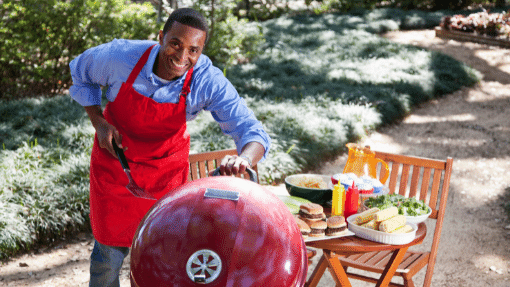Summer’s here and who doesn’t love a barbecue? Grilling is a healthy way to eat less calories and fat though technique is key to serving a meal that is healthy in all ways.
 Chemicals called heterocyclic amines (HCAs) and polycyclic aromatic hydrocarbons (PAHs) are formed when meats are cooked using high-temperature methods and dripping fat and juices cause flames and form in smoke that lands on it. These chemicals can damage our DNA and possibly increase our risk of developing certain cancers. While research is ongoing and the jury is still out, here are some easy ways you can minimize your exposure to these potential carcinogens and still enjoy barbecuing.
Chemicals called heterocyclic amines (HCAs) and polycyclic aromatic hydrocarbons (PAHs) are formed when meats are cooked using high-temperature methods and dripping fat and juices cause flames and form in smoke that lands on it. These chemicals can damage our DNA and possibly increase our risk of developing certain cancers. While research is ongoing and the jury is still out, here are some easy ways you can minimize your exposure to these potential carcinogens and still enjoy barbecuing.
10 tips for safer summer grillin’
- Keep the grill surface clean to help prevent harmful chemicals from building up and transferring to your food.
- Use an acidic marinade containing vinegar or lemon juice and herbs like mint, garlic and rosemary to greatly reduce the formation of HCA (avoid honey or sugary marinades that can cause charring and more HCA).
 Grill fish! It has less fat and cooks faster than meat and poultry.
Grill fish! It has less fat and cooks faster than meat and poultry.- Lightly oil the grill. Don’t use lighter fluid, if possible
- Choose leaner and thinner cuts of meat that will cook faster. Trim any fat or wrap meat in foil to prevent it from dripping and producing more smoke and flare-ups.
- Partially cook larger cuts of meat inside (oven, microwave) and just finish them on the grill, flipping frequently to reduce char marks. Avoid pressing on food with a spatula which releases drippings and creates more smoke.
- Don’t char or burn meat, poultry or fish, and don’t eat any charred or blackened areas.
- Use a meat thermometer to know when food is done. Don’t cook red meat until it’s well-done. Cook at lower temperatures, even if it takes longer.
- If you use a charcoal grill, replace the charcoal after each use.
- Grill veggies and fruits! They are delicious and do not form carcinogens themselves when grilled. (You can wrap them to avoid smoke from grilled meats cooking at the same time)


Recent Comments